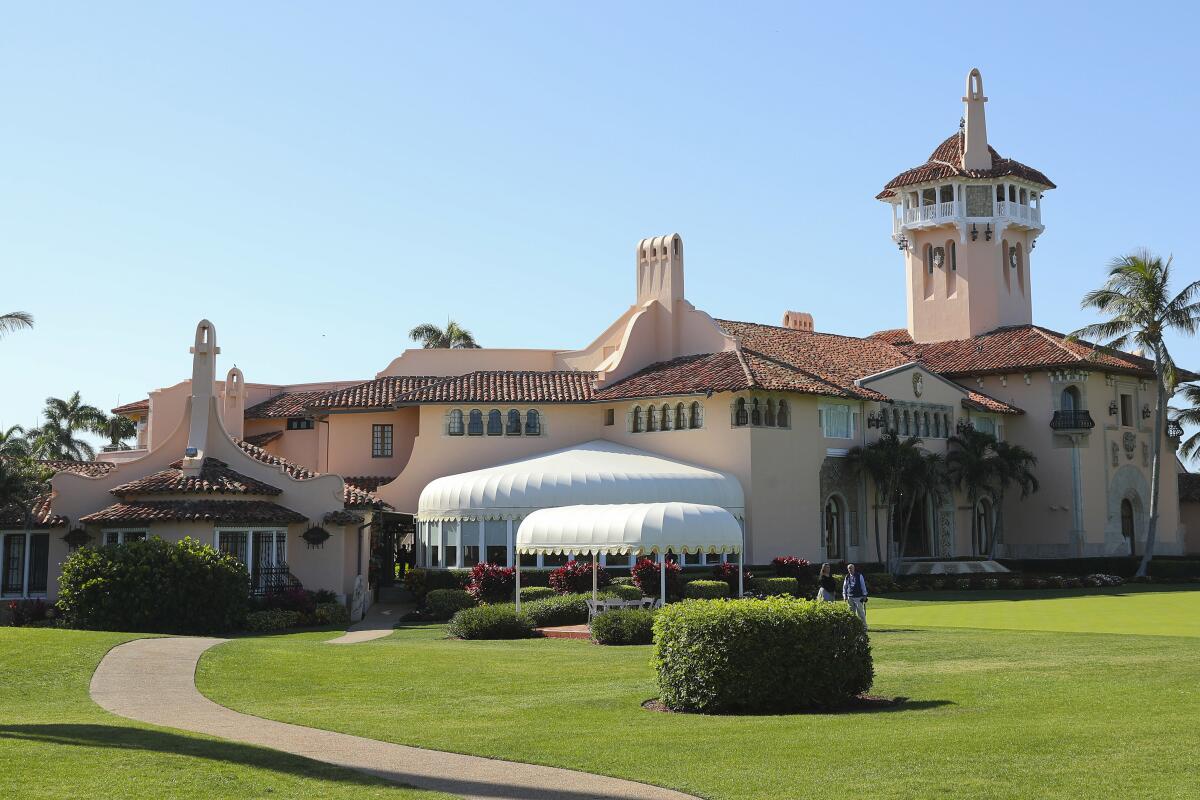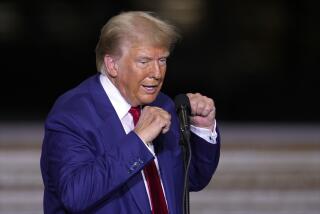Trump legal team opposes limiting special master review, suggests materials might not be classified

- Share via
WASHINGTON — Former President Trump’s legal team said in a court filing Monday that classified materials should not be excluded from the special master’s review of documents found during an FBI search of his Mar-a-Lago estate, suggesting that some of the documents may not be classified and that Trump may have the right to keep them in his possession.
“The Government has not proven these records remain classified,” Trump’s attorneys stated in the filing. “That issue is to be determined later.”
This is the first time Trump’s team has hinted in court that the former president may have declassified the documents while in office, though they never directly state whether he did. Trump and his allies have made that argument on social media and cable news, but the U.S. intelligence community has indicated normal declassification procedures didn’t take place. Normally, if a president declassifies American secrets, the intelligence community would be informed so it could change intelligence-gathering methods or move confidential human sources.
The Department of Justice told U.S. District Judge Aileen Cannon last week that it would appeal to the U.S. 11th Circuit Court of Appeals by Thursday if she allows a third-party special master to analyze about 100 classified documents as part of a review of the more than 11,000 records and materials taken during the court-approved Aug. 8 search. The review is aimed at weeding out any materials that might be protected by claims of attorney-client or executive privilege.
Cannon approved Trump’s request for the outside legal review last week, temporarily preventing the department from using the documents as part of its criminal investigation. She agreed to allow a national security review of the documents to continue, but enjoined the Justice Department from using the materials until the special master’s review is complete.
But the department said in a filing last week that Trump has no reasonable claim over classified documents, which belong to the government, and the national security review cannot reasonably move forward unless the FBI can participate. The government asked Cannon to partially lift her stay and allow the department to continue using the classified documents as part of its investigation while a special master reviews the other recovered items.
Trump’s lawyers argued in Monday’s filing that a review of all the recovered materials must be performed for transparency’s sake, calling it “a sensible preliminary step towards restoring order from chaos.”
They said that prosecutors overstate the national security concerns in their request for a stay and that “there is no indication any purported ‘classified records’ were disclosed to anyone.”
“This investigation of the 45th President of the United States is both unprecedented and misguided,” the attorneys wrote. “In what at its core is a document storage dispute that has spiraled out of control, the government wrongfully seeks to criminalize the possession by the 45th President of his own presidential and personal records.”
Much of Monday’s filing focuses on the Presidential Records Act of 1978, which dictates proper preservation of records created by or for the president while in office.
But the department isn’t investigating violations of that act, which is ultimately an administrative fight between the former president and the national archivist. According to the search warrant, which was unsealed in a separate case, the alleged crimes under investigation are violations of the Espionage Act, which outlaws the unauthorized retention of national security information that could harm the United States or aid a foreign adversary; a federal law that makes it a crime to destroy or conceal a document in order to obstruct a government investigation; and another statute associated with unlawful removal of government materials.
Federal law defines a presidential record, which is created by or for a president while in office, and a government record, which is created by the government, differently. For example, classified information collected by the CIA would be considered a government record, but the president’s handwritten notes from a meeting about that classified information would be a presidential record.
In a separate filing, the Justice Department urged Cannon to pick either of the two retired judges it suggested to be special master — Barbara Jones, who served on the federal bench in Manhattan and has performed the same role in previous high-profile investigations, and Thomas Griffith, a former federal appeals court judge in the District of Columbia — or the judge on senior status suggested by Trump’s team, Raymond Dearie, who is also the former top federal prosecutor in the Eastern District of New York.
All three judges have substantial experience presiding over federal criminal and civil cases, including some involving national security and privilege concerns, the department said in its filing. The department urged Cannon to reject Trump’s other pick, prominent Florida lawyer Paul Huck Jr., saying he did not have the same experience.
Trump’s lawyers urged Cannon in their own briefing to reject the department’s choices, but declined to state a reason in their filing, saying “it is more respectful to the candidates from either party to withhold the bases for opposition from a public, and likely to be widely circulated, pleading.”
More to Read
Get the L.A. Times Politics newsletter
Deeply reported insights into legislation, politics and policy from Sacramento, Washington and beyond. In your inbox three times per week.
You may occasionally receive promotional content from the Los Angeles Times.











